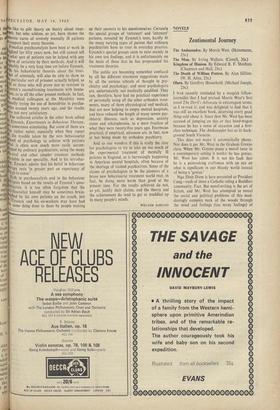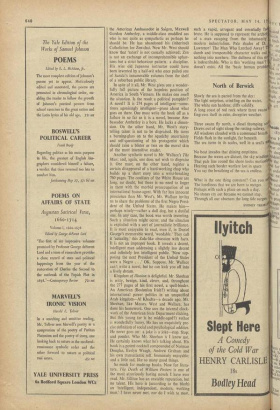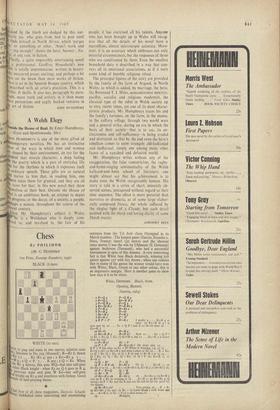NOVELS
Zentimental Journey.
Olura. By Geoffrey Household. (Michael Joseph, 25s.) I WAS recently reminded by a waspish fellow- journalist that I had praised Morris -West's first novel The Devil's Advocate in extravagant terms, so I re-read it; and was delighted to find that it was still an excellent book, deserving every good thing said about it. Since then Mr. West has been accused of jumping on this or that band-wagon because he has a sense of occasion and a first- class technique. The Ambassador has as its back- ground South Vietnam.
This does not make it automatically phony. Nor does it put Mr. West in the Graham Greene class. When Mr. Greene poses a moral issue in a contemporary setting it works; he has genius; Mr. West has talent. It is not his fault that he is a painstaking craftsman with an eye on what is significant in our bloody world instead of being a 'genius.'
Ngo Dinh Diem is here presented as President Cung—each of them a Catholic ruling a Buddhist community. Fact. But novel-writing is the art of fiction, and Mr. West has attempted to reveal the social and political problems of this mad- deningly complex neck of the woods through the mind and feelings (too many feelings) of the American Ambassador in Saigon, Maxwell Gordon Amberley, a middle-class muddled ass who is not quite as sympathetic as perhaps he should be. He has abandoned his (inherited) Catholicism for Zen-chat. Now Mr. West should know that `satori' is not casually achieved; Zen is not an exchange of incomprehensible aphor- isms but a strict behaviour pattern: a discipline.
His wise old Japanese instructor could have been invented by a half-wit who once pulled one of Suzuki's innumerable volumes from the shelf of a suburban public library.
In spite of it all, Mr. West gives one a wonder- fully full picture of the hopeless position of America in South Vietnam. He makes one smell the situation. Is the result a political pamphlet? A novel? It is 274 pages of intelligent—some- times agonisingly intelligent—prose about what goes on there. One must write the book off as a failure in so far as it is a novel, because Am- bassador Amberley is a bore. He lacks a dimen- sion. On the other hand, Mr. West's story- telling talent is not to be dispraised. He turns a burning-glass on to the squelchy uncertainty and self-questioning of his protagonist which should raise a blister or two on the moral skin of the most insensitive reader.
Another synthetic novel is Mr. Wallace's The Man; and, again, one does not wish to dispraise it. One must, on the other hand, register a certain disapproval of a hard-working chap who builds up a short story into a wrist-breaking 760 pages. The coulisses of the White House are long, no doubt, but there is no need to linger in them with the morbid preoccupation of an international house-agent. With far less innocent prescience than Mr. West's, Mr. Wallace invites us to share the problems of the first Negro Presi- dent of the United States. He makes him— perhaps wisely—rather a dull dog, but a dutiful one. In any case, the book was worth inventing. Such a situation might occur, and the situation is exploited with a sort of journalistic brilliance. It is most enjoyable to read, even if, in Daniel George's memorable word, `weedable.' They call it 'actuality,' this Zola-like obsession with facts. It is not an improper book. It reveals a decent, intelligent man addressing a slightly less decent and infinitely less intelligent public. 'Now sup- posing the next President of the United States were a Negro . . OK. Suppose. Mr. Wallace can't write a novel, but he can kick you off into a lively dream.
Kingdom of Illusion is delightful. Mr. Sheehan is witty, benign, kind, clever, and, throughout the 277 pages of his first novel, a spell-binder. An American (Bostonian Irish?) writing about international power politics in an unspecified Arab kingdom—Al Khadra—a decade ago, Mr. Sheehan, like Messrs. West and Wallace, has done his homework. One sees the internal clock- work of the American State Department clicking. But this young (or is he middle-aged?) author is wonderfully funny. He has an exquisitely pre- cise definition of social and psychological oddities. He never goes on: a joke is a joke—stop. Stop; and ponder. Who Mr. Sheehan is I know not. He certainly knows what he's talking about. His book is a potent cocktail compounded of Norman Douglas, Evelyn Waugh, Andrew Graham and his own transatlantic self. Immensely enjoyable; and a little sad, like so many good things.
So much for made-up books. Now for litera- ture. The Death of William Posters is one of the most atrociously boring novels I have ever read. Mr. Sillitoe has an enviable reputation, but no talent. His hero is (according to the blurb) an 'intelligent, independent, modern, working man.' I have never met, nor do I wish to meet, such a vapid, arrogant and essentially fe brute. He is supposed to represent the archetl of a man escaping from the inhumanity modern industrialism. Pale shades of D. Lawrence! The Man Who Lurched Away! dumb and irresponsible character walks out nothing into nowhere. The dullness of this no is indescribable. Who is this 'working man'? doesn't exist. All the 'basic human proble nuked by the blurb are dodged by this nar- ssistic ass. who goes from bed to post until finds himself in North Africa, which 'purges In or something or other. 'Aren't work and -- ing enough?' shouts the hero. Answer: No. )i. at any rate, in fiction. Finally, a quite impossibly entertaining novel a professional. Geoffrey Household's new ook is totally unpretentious: written in beauti- uh measured prose; exciting; and perhaps a bit ,,ore on the beam than most works of fiction. Ana is set in the Spanish Basque country. which .described with an artist's precision. This is a ;!filler. It thrills. It also has, paragraph by para- ph, more truth and artistry in it than many tti re pretentious and cagily backed ventures in




































 Previous page
Previous page